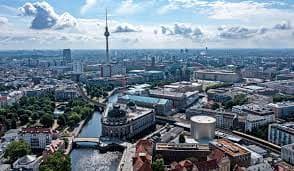Explore the Academic Richness of Berlin
Dive into Berlin's world-class universities and research institutions, a city celebrated for its historic and contemporary academic achievements. Discover why Berlin stands out as a premier destination for education and research.

Learn about Universities, Colleges & Academic in the City of Berlin
About the Colleges & Universities in Berlin
Berlin, the capital city of Germany, is renowned for its diverse and comprehensive higher education landscape, featuring a multitude of universities and colleges that cater to a wide array of academic disciplines and research interests.
The city's institutions, such as the Humboldt University and the Free University of Berlin, are known for their innovative research, high-quality teaching, and vibrant student life, making Berlin a magnet for students and scholars from around the globe.
- Humboldt University of Berlin
- Free University of Berlin
- Technical University of Berlin
- Berlin University of the Arts
- Charité - Universitätsmedizin Berlin
- ESMT Berlin
- HTW Berlin - University of Applied Sciences
- Beuth University of Applied Sciences Berlin
Nobel Laureates from Berlin
Berlin's academic heritage is illuminated by its association with numerous Nobel Laureates who have made significant contributions across various fields, emphasizing the city's longstanding tradition of excellence in research and academia.
Notable laureates affiliated with Berlin's institutions include Albert Einstein, awarded the Nobel Prize in Physics in 1921, and Emmanuelle Charpentier, awarded the Nobel Prize in Chemistry in 2020 for the development of CRISPR-Cas9 gene editing.
- Albert Einstein
Physics (1921) - Humboldt University of Berlin - Emmanuelle Charpentier
Chemistry (2020) - Humboldt University of Berlin
Notable Academics Practicing in Berlin
Berlin's universities are home to world-renowned academics whose groundbreaking research and dedication to teaching continue to enrich the city's educational offerings and contribute to its global academic reputation.
This includes luminaries like Harald zur Hausen, whose work on human papillomaviruses led to the discovery of their role in cervical cancer, earning him the Nobel Prize in Physiology or Medicine in 2008.
- Harald zur Hausen
Nobel Laureate in Physiology or Medicine - Stefan W. Hell
Nobel Laureate in Chemistry
Considering moving to Berlin? Here's a rundown!
Berlin offers an unmatched blend of historical significance and modern academic innovation, providing students and academics with endless opportunities for growth, research, and collaboration in one of Europe's most dynamic cities.
The city's rich cultural scene, combined with its comprehensive academic programs and state-of-the-art research facilities, makes Berlin an attractive destination for pursuing academic excellence and career development.
